Month 8:22, Week 3:7 (Shibi'i/Sukkot), Year:Day 5955:228 AM
2Exodus 7/40
Gregorian Calendar: Saturday 7 November 2020
Spiritual Equipping IV
Baptised with the Spirit & Fire
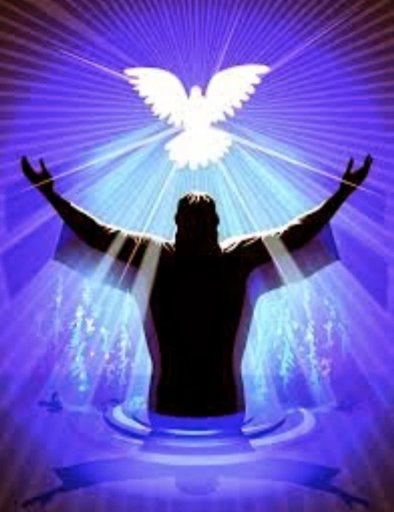
Continued from Part 3
Introduction
Shabbat shalom kol beit Yisra'el and Mishpachah, and welcome back to the fourth in our series on Spiritual Equipping and particularly on Spirit and Fire Baptism. There are many questions to answer such as, How many baptisms are there actually - one, two, or three?
Seven Baptisms?
One minister, Finnis Jennings Dake, famous in Pentecostal circles for his controversial annotated Bible and his 1,000+ page book, God's Plan for Man in which he lays out the entire Gospel as he sees it as a kind of jigsaw puzzle, claimed there were seven baptisms in the Messianic Scriptures (New Testament)! He arrived at this conclusion by basically grouping all the passages that he could find about baptism together, using the second of the Four Approaches to Scripture Study that we discussed last week, namely the supposedly systematic approach that relies on the Sola Scriptura Protestant model. These are the seven he identified:
- 1. John's baptism in water (Mt.3; Lk.3; Ac.1:5; Jn.1:31-24);
- 2. Baptism in water by Yah'shua's (Jesus') talmidim (disciples) (Jn.3:22-23; 4:1-2; 5:43; 10:25);
- 3. Moses' baptism in the cloud and in the sea (1 Cor.10:2);
- 4. The baptism of suffering (Lk.12:50);
- 5. Baptism "into Messiah" and into His Body, the Messianic Israelite Community (Rom.6:4; 12:4-5; 1 Cor.10:17; 12:13; Gal.3:27; Eph.4:5; Col.2:12);
- 6. Christian/Messianic water baptism in the Name of the Father, and of the Son, and of the Ruach haQodesh (Holy Spirit) (Mt.28:19; Mk.16:6; Ac.2:38,41; 8:12-16,36-38; 9:18; 10:48; 16:15,33; 18:8; 19:6; 22:16; 1 Cor.1:13-17; 1 Pet.3:21); and
- 7. Baptism in the Ruach haQodesh (Holy Spirit)
The 'Baptism of Suffering'
All but one of these describe events in points of time for the individuals receiving these baptisms. We'll return to this list later but for now I want to draw your attention to #4, what Dake calls 'the baptism of suffering' which I believe he has misunderstood or at least only partially understood for he failed to link it to his last category, namely, Baptism of the Spirit. I am going to read that passage to you by way of an introduction to prime your thinking and then return to it toward the end of my presentation. We'll also read the verses before and after the reference he gives:
"'I came to throw fire upon the earth,' Yah'shua (Jesus) continued, 'and I wish it were already alight! I have a baptism to be baptised with, and I am under huge pressure until it's happened. Do you suppose I have come to give peace to the earth? No, let me tell you, but division. From now on, you see, families will be split down the middle: three against two in a family of five, and two against three, father against son and son against father, mother against daughter and daughter against mother, mother-in-law against daughter-in-law and daughter-in-law against mother-in-law'" (Lk.12:49-53, KNT).
I invite you to read the whole 12th chapter of Luke afterwards. So, remember this passage, and especially how it began in verse 49, as we go through today's presentation.
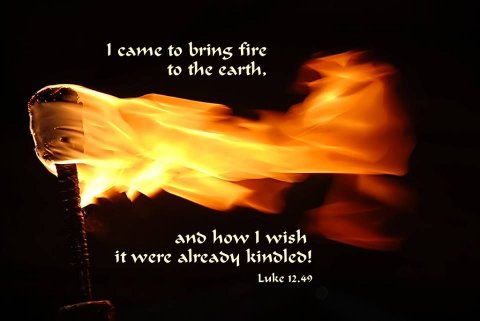
Matthew 3
I hope you have had time to digest the material I shared with you last week and that you have also managed to spend a little time studying chapter 3 of the Gospel of Matthew. Why is this chapter so important? Because it tells us what the baptism in fire actually is (as opposed to what we may imagine, or want, it to be, based on our traditions) and gives us clues as to what the Baptism of the Ruach (Spirit) is too. So we'll go straight there this morning. As is my custom, I'll be alternating between Bible versions to give contrast though by all means follow in your New King James Versions as we shall most certainly be using that too as our 'springboard' translation. I'll largely be using N.T.Wright's scholarly Kingdom New Testament (Harper, NY: 2011) in contemporary English today and as usual I shall be messianifying the text and adding explanatory linguistic comments as needed.
Background to the Story
So let's jump straight in. The setting is first century Judea. The nation is under Roman occupation which is a direct consequence of its disobedience and violation of covenant. It's messianic expectations have reached feverish point, though, with religious bandits and terrorists - zealots and others - roaming the country in the name of 'Adonai' (the title given to Yahweh by the rabbis meaning 'Lord' or 'Master') hoping to start another Maccabean-type war of liberation. Their forefathers had won that one against the Greeks, their independent nation had lasted about a century before bloody infighting and the ever ubiquitous sinning led to a new invader and new masters in the land from Rome.
The Wild Prophet from the Desert
Into that mixture of politics, religion and conspiracy, Yahweh sent a navi or prophet, the greatest, according to the testimony of Yah'shua (Jesus), the nation had ever been sent by Yahweh up until that point (Mt.11:11; Lk.7:28), of whom Isaiah prophesied, saying that he would be someone "shouting in the desert, 'prepare the route that the Master will take, straighten out His paths!'" (Mt.3:3, KNT), a man of no social standing as far as wealth or power were concerned, but rather dressed crudely with camel hair held around him by a leather belt and eating a strange, but not prophetically insignificant, diet of locusts and wild honey (Mt.3:4). "'Repent,' he was saying, 'for the Kingdom of Heaven is coming'" (Mt.3:2, KNT).
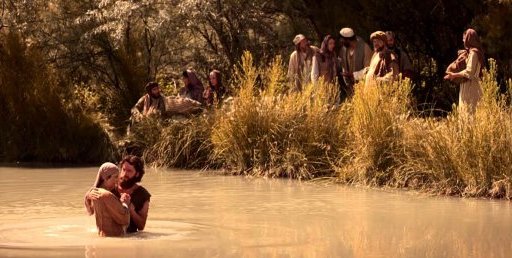 John the Baptiser immersing penitents in the River Jordan
John the Baptiser immersing penitents in the River Jordan
A Prophetic Diet of Locusts and Honey
There are reasons John the Baptist clothed and ate that way. Camel's hair is prickly to the skin just as his message was to the sinners of the day. Yahweh's messengers are always prickly - agitating - to sinners. His diet was locusts, one of the few kosher insects whose presence in large numbers is usually cause for panic, even in our day, because they bespeak pestilence. What a navi (prophet) eats is a prophetic picture of the message he must deliver and its affect on himself. John the Apostle was told to eat a scroll containing the message he would have to speak (Rev.10:9), as the navi (prophet) Ezekiel had been before him:
"Moreover He said to me (Ezekiel), 'Son of man, eat what you find; eat this scroll, and go, speak to the house of Israel.' So I opened my mouth, and He caused me to eat that scroll. And He said to me, 'Son of man, feed your belly, and fill your stomach with this scroll that I give you.' So I ate it, and it was in my mouth like honey in sweetness" (Ezek.3:1-3, NKJV).
Honey of the Prophets
Now you know why John the Baptist was eating honey, and specifically, wild, uncultivated (raw) honey. So what does 'honey' signify in Ezekiel's case? You have to remember that Ezekiel was a navi (prophet) to the exiles in Babylon who were there because of sin, the same fate that the Judeans in the first century would also come to experience at the hands of the Romans some decades later after Matthew wrote his account. Though the expectations of the people in exile was that they would soon return to Jerusalem and Judea and find it largely intact, Ezekiel knew better. And so the the first seven years of his ministry (593-586 BC) before the actual exile, his message to them was heart-rending, being filled with harsh, hope-crushing words of divine judgment: Jerusalem would fall, the temple would be destroyed, and there would be a long exile. So why did these terrible words taste like sweet honey in the navi's (prophet's) mouth? Was good news mixed in with the bad? This was Ezekiel's experience in receiving the Davar Elohim or Word of God. This was good news for Ezekiel and for the righteous only. Likewise Jeremiah, another navi (prophet) of roughtly the same time period, whose prophetic message was just as devastating for the sinners as Ezekiel's, records:
"Your (Yahweh's) words were found, and I ate them,
And Your Davar (Word) was to me the simcha (joy)
and rejoicing of my heart;
For I am called by Your name,
O Yahweh-Elohim Sebaoth (of hosts/armies)" (Jer.15:16, NKJV).
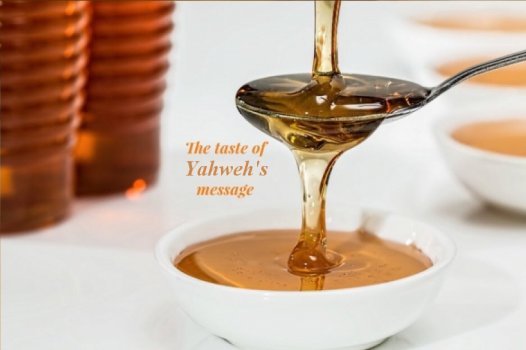
The Paradox of Suffering and Joy
To understand the mystery of Baptism in the Spirit and Fire you need to understand the mystery of Ezekiel, Jeremiah, John the Baptist and John the Apostle: the devarim (words) of Yahweh are as sweet as honey to the one receiving them no matter whether the message is good or bad, because His presence is the main thing. That is why spiritually-regenerated believers in Yah'shua (Jesus) can experience inner simcha (joy) even when everything around them is in turmoil and terror stalks the land. Only one who is spiritually born-again can understand that. There is nothing perverse in it. It isn't a question of being so absorbed in Yahweh that you or suddenly start not caring about people, or that you become disonnected from the awful reality on the outside world - as Judea experienced in Babylon and as Judea would once more experience under the Romans of which they are being forewarned by John the Baptist and others in the first century.
Dirges of the Prophets
John the Baptist's message was a terrible one represented by famine- and pestilence-bearing locusts but it was also sweet and comforting to himself and to those who did repent and who did receive Yah'shua (Jesus) as their Messiah. We know the nevi'im (prophets) sorrow at sin and suffering - we know how Jeremiah, the weeping navi (prophet), mourned the end of Judea! Yah'shua (Jesus) absolutely did the second time round! Do you remember His dirge?
"Jerusalem, Jerusalem, the one who kills the nevi'im (prophets) and stones those who are sent to her! How often I wanted to gather your children together, as a hen gathers her chicks under her wings, but you were not willing! See! Your house is left to you desolate..." (Matt.23:37-38, NKJV).
Yet all of these servants of Yahweh had something within them that simultaneously gave them simcha (joy) to ameliorate the pain of watching sinners reap the consequences of their sinning. That's all the prophetic symbolism means but it's a vital key to understanding what true discipleship consists of. It's not all plain sailing.
The Road, the Water, the Fire and the Axe
John the Baptist's message was simple and straightforward. The 'road' for Judea and the rest of the country through Samaria and Galilee would be marked by four elements or items: the road itself, water, fire, and the the axe. John cried out to the religious leaders watching him:
"The axe is already is already taking aim at the root of the tree. Every tree (= person) that doesn't produce good fruit is to be cut down and thrown into the fire" (Mt.3:10, KNT).
Pointers to Spirit and Fire Baptism
These four powerful symbols - the road or way that has to be cleared for the Messiah (as prophesied by Isaiah), water (for baptism), fire (to burn away all dross and impurity), and the axe to cut down the lives of the wicked - are all linked to Spirit and Fire Baptism as we shall see. Remember them as we approach our main subject.
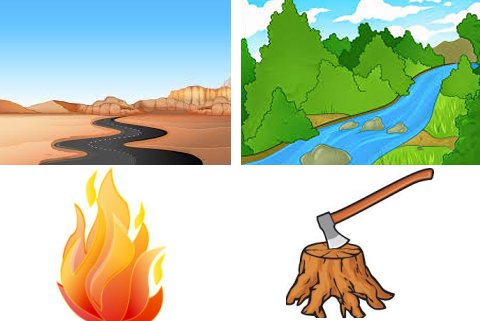
Constructing a Road for Messiah
The message of John is that the rightful King-Messiah (Yah'shua/Jesus, not the usurper Herod) is coming back after a long absence so a road needs to be prepared. But there isn't one! So John, the Herald, goes shouting to the peoples of the desert and instructs the covenant people - Israel - to make one, and to make it good and straight. That's a picture of individual and collective, national repentance and it tells us that repenting, as in making a good road, requires a lot of hard work. That's why we're giving the seven day-long festival of Chag haMatzah or the Feast of Unleavened Bread each year to remind ourselves to make every effort to actively get the leaven of sin out of our lives, down to the tintest speck, through daily repentance, so that there is a good road in our souls for Yah'shua (Jesus) to walk on. He is, Himself, the Derech, Way or Road (Jn.14:6). Reality check: the flesh would rather not have to do this but rely instead on grace alone!
The Promise of Deliverance
You could argue, I suppose, that this wild or 'basic' honey is not just good news for the navi (prophet) but for the people receiving his message because it means that everyone repenting can receive this simcha (joy) in spite of their adverse circumstances which in this case is a harsh Roman occupation and is the common lot of man in every generation in one way or another. That would be true of both John the Baptist's listeners there and then and of John the Apostle's readers later. This message of hope, forgiveness and healing for the nation after the horrors of the exile had been around since Isaiah 40 so it wasn't exactly a new message, yet as we know sinners are 'hard of hearing' and the message has to be repeated again and again before it sinks in, often by multiple nevi'im (prophets) and over many generations, in order to get a national response. And the track record of Israel and Judah was not, as we know, very good.
The People Pay Attention
The promise has always been there, and remains there even in our own day at a time of global judgment, that Elohim (God) would come back, bringing both comfort and rescue. And John the Baptist was saying, there and then, that that was about to happen! And as you would expect, that made everyone sit up and take note, because there hadn't been an authentic navi (prophet) for generations, a reason there's a gap between Malachi and Matthew, the so-called 'inter-testamental period'. They stopped what they were doing and gathered to where he preached to listen to him, just as in our day the same thing is happening as discouraged and disillusioned Christians and Messianics are desperately seeking for prophetic voices to lead them once more.
Words and Spirits
Last week and the week before we carefully examined some key words like 'charismata', 'spirit' and 'word' only to discover they were far more complex than we had at first imagined them to be. We saw that there were three different words in Hebrew for 'spirit', neshamah, ruach and nefesh that are the spiritual life (chayah) in man's physical body of 'clay'.
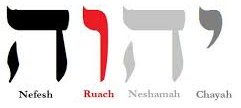
Learning to 'Think' Hebrew
We learned that there were interactions between them and the physical body leading to seven overlapping activity areas, reminding us of the Seven Ruachot Elohim or Spirits of God (Rev.3:1; 4:5; 5:6). We saw the confusion between 'spirit', 'soul', 'psyche' and other words that English has absorbed from different languages that has led to confusion and to all sorts of denominational factions in the Body of Christ. A congregational teacher must therefore learn to leave the English language of his Bible behind and enter the world of the text by understanding its Hebrew, Aramaic and/or Greek context and to do so without using English words in his mind. We have to do the same thing with culture by setting our English-language categories aside and leave our cultural ideas behind too. We must learn to 'think' and 'speak' key words like 'neshamah', ruach', nefesh, davar, miltha and logos which is why I use them all the time in my sermons and writings in order to gradually acclimatise you to the original thinking and meaning of the authors in Scripture. As you become more familiar with them you will begin to see with ever greater clarity the difference between the original sense and our translations. Don't be too hard on all the translators, though - it's not an easy job!
The Meaning of 'Baptism'
There are two words we did not consider last week but we can do so now as we run through the Matthean text. The first of these is 'baptism' which comes from a Greek work, baptizo, meaning 'immerse', 'dunk', 'plunge', 'dip', 'make completely wet' or 'submerge'. What it doesn't mean is 'sprinkle'. The people who came to hear John the Baptist or Baptiser preach at the River Jordan came to repent, or completely change the direction of their lives back to Yahweh, and to be immersed in water as a sign of their total change of mind and heart. It was not a half-hearted or partial turning that John was calling them to make. Baptism is one of the most important, and therefore emphasised, ordinances of the Messianic or Christian faith because of what is symbolises or represents spiritually. It is only for those willing to make a new beginning in their lives and to seek permanent membership in Elohim's (God's) Family, the Body of Christ or Messianic Israel. In it's fuller messianic sense, it means to be immersed into the death of Christ - as being buried in the grave - and then arising into new resurrection life. It is an outward human action representing a supernatural inward change.
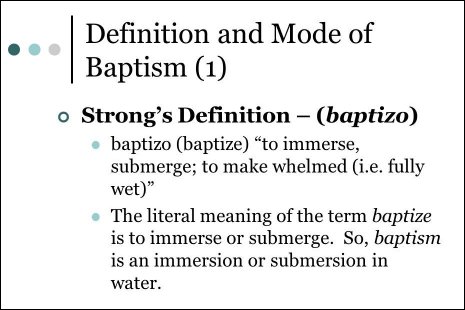
The Mikveh Ritual
Yet baptism was not invented by John the Baptist. The people turning up at the Jordan River weren't saying to themselves when they arrived, 'Oooh, what's this new ordinance, then? I've never seen that before!' It was something they were very familiar with albeit in a different setting, but the symbolism was nearly identical. For some 3,000 years prior the Israelites had practiced a ritual washing known as the mikveh but the word is even older than that particular usage. As early as Genesis 1:10 we read:
"And Elohim (God) called the dry land Earth, and the gathering together (miqveh) of the waters (mayyim) He called Seas (yammim). And Elohim (God) saw that it was good" (Gen.1:10, NKJV).
An Abundance of Water
Another passage, in Leviticus 11:36, will make the idea of mikveh even clearer still:
"...a spring or a cistern, in which there is plenty (miqveh) of water (mayyim), shall be clean..." (Lev.11:36, NKJV).
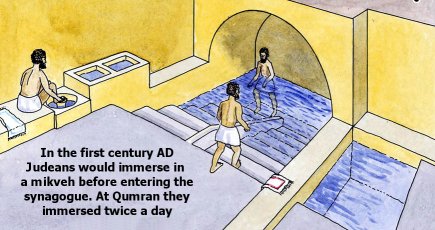
The Temple Mikvehs of the Past
In other words, a mikveh originally meant a large body, or gathering together, of (in this case) water, as in a river, the sea or a largish pool. Hundreds of mikveh or baptismal baths have been discovered by archaeologists at the entrance to the Temple at Jerusalem into which every temple-goer was requiried to 'dip' or 'immerse' himself in order to be ritually clean before entering that sacred structure. That would be done by each person at least three times a year at the Pilgrim Festivals of Pesach (Passover), Shavu'ot (Weeks, 'Pentecost') and Sukkot (Tabernacles). When Yah'shua (Jesus) and His talmidim (disciples) went into the Temple to pray, as they did many, many times (Mt.26:55; Mk.14:29; 22:52; Ac.2:46; 3:2; 5:42) they would each have passed through a small mikveh bath and literally 'baptised' themselves, separating themselves to Yahweh, thus ritually or symbolically making themselves qadosh or 'holy'. Many Jews still do this today before the Sabbath. Pilgrims coming up to the Jerusalem Temple viâ the old City of David in the south would pass through the large Pool of Siloam for the same purpose. This pool was recently excavated, along with the road leading to the Temple which is currently underground because the Romans buried Jerusalem completely after its burning and sacking. The Pool of Siloam was no mean puddle either but about twice the size of a modern football stadium.
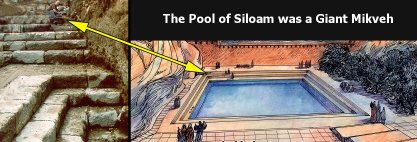
Three Anointings
What's important is what this 'baptism' or mikveh represented then and what it represents today in the New Covenant. Once we've understood that, we'll tie that in with Ruach (Spirit) Immersion and Fire Immersion and ask ourselves what spiritual mayyim or water(s) is/are, the three types (neshamah, ruach and nefesh) and the Three Pilgrim Festivals, not to mention the Final Gathering or Mikveh and the Last Exodus. This may take us two or three more weeks of study but it will not only be time absolutely well spent but you will come to see it as a necessary emet (truth) that must be mentally grasped as well. But it was, and still is, an actual existential anointing to be experienced because not only was there an immersion, baptism or anointing of the Ruach (Spirit) at the first Messianic Shavu'ot (Weeks, 'Pentecost') but there is yet a baptism or anointing of the Ruach (Spirit) to come at the first Messianic Sukkot (Tabernacles) which will be quite unlike anything before it. And, no, it hasn't come yet, though we hoped it might have begun, as we shall also see.
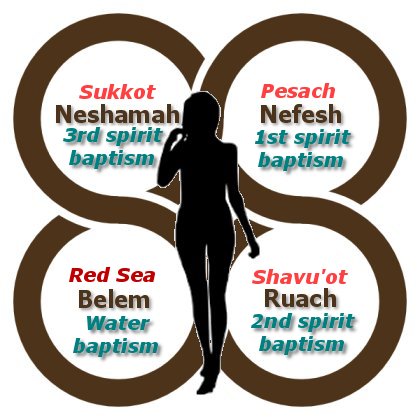
A Proper Temple Gathering Place
The reason why it hasn't happened yet is because, like the word 'miqveh' itself, there must first be a proper gathering or body of Remnant believers assembled in the proper place. And as you may remember from a sermon a while ago, the place where the talmidim (disciples) were gathered, when the first Messianic Shavu'ot or 'Pentecostal' anointing took place after the Omer count had been completed when the believers spoke languages supernaturally, was not in a private house but in the Jeruslam Temple. Thus the next supernatural anointing in any sequence of anointings must take place in the sacred House of Yahweh where the previous anointing had taken place. Therefore, if the same divine tavnith or pattern is being followed, the Sukkot Anointing must take place in the current 'New Covenant House of Yahweh' which we will speak of another time. The two or three of you who were around when this work first began in Norway in the late 1980's and early 1990's may recall that two mikveh baths were part of the projected temple design, one for the men and one for the women [1].
Sign of the Future Kingdom on Earth
John the Baptist plunged the compliant inhabitants of Judea and neighbouring regions into a large 'body' or 'gathering' (miqveh) of water, the Jordan River. These Judeans came to him to publically confess their sins and be baptised, just as the apostle Philip would later plunge the Ethiopian official into a body of water into which the two had first "descended" (Ac.8:36-39). This immersion wasn't just symbolic of a cleansing effected by the Ruach (Spirit) but (and remember there are always multiple prophetic layers or levels involved in divine symbols like this) it was a collective or corporate sign of the new thing that Yahweh was doing in history itself, both for Israel and for the whole world.
Joshua's Crossing of the Jordan
1,000 years earlier the children of Israel had supernaturally crossed the River Jordan under the leadership of Joshua when they first entered and conquered the Promised Land. Now, 1,000 years later, they had to 'pass', as it were, through the same river again as a sign that they were getting ready for a greater conquest - Yahweh's defeat of all evil in themselves, in the nation of Israel, and in the whole world, prior to the establishment of His Kingdom on earth...as in Heaven. Yah'shua (Jesus) would therefore teach His talmidim (disciples) to always pray:
"Our Father which art in heaven, Hallowed be thy name. Thy kingdom come. Thy will be done in earth, as it is in heaven" (Matt.6:9-10; Lk.11:2, KJV).
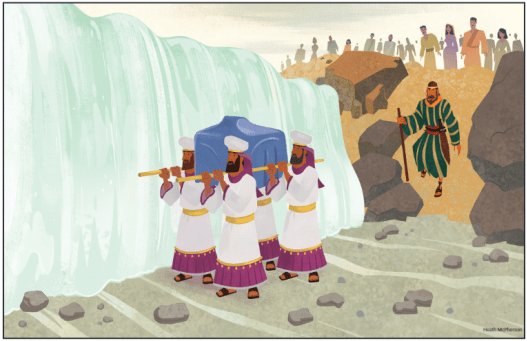 Joshua leads Israel across the River Jordan
Joshua leads Israel across the River Jordan
A Consuming Fire for the False Religious Leaders
Now as we have seen in the text of Matthew 3:1-10, John the Baptist's message wasn't all comfort or 'sweet honey'. Far from it. He also spoke of a fire that would blaze and an axe that would chop down trees as part of this coming of the Kingdom both for the individual seeking to get into right relationship with Elohim (God) and for Israel as a whole. When the Pharisees and Sadducees came along to see what was going on, John the Baptiser fiercely rebuked them for coming to be baptised, immersed or receive a mikveh from him, crying out:
"'You brood of vipers!...Who warned you to escape from the coming wrath? You'd better prove your repentance by bearing the right sort of fruit!'" (Mt.3:7b-8, KNT)
The Fire is the Final End of Water Baptism Without Repentance
John was warning them that the ordinance of physical water immersion was not the main thing but the first of three processes that would have to first take place in minds and hearts. If people fake their repentance and think baptism will become a ticket into the Kingdom of Heaven without anything more than repeating some formula (like the 'Sinner's Prayer') without any sort of soul-connection, which in turn would result in no bearing fruits of righteousness, then all that would be left for them was felling - the axe - followed by casting into fire:
"The axe is already taking aim at the root of the tree. Every tree that doesn't produce good fruit is to be cut down and thrown into the fire" (Mt.3:10, KNT).
or in the New King James Version:
"And even now the ax is laid to the root of the trees. Therefore every tree which does not bear good fruit is cut down and thrown into the fire" (Matt.3:10, NKJV).
Notice that John said nothing about being cast into any 'eternal hell-fire' so don't go taking a theological leap in that direction, which which is far beyond what Scripture actually says, even though that's what hellfire-and-damnation preachers commonly like to do. Likewise don't take a leap in a parallel direction and assume that John is talking about the annihilation of souls as the Jehovah's Witnesses and others teach. Don't go beyond the text.
Infant Baptism and Sprinkling
That is why no one should ever be baptised who has not first genuinely repented of their sins after being conviced by the Ruach (Spirit) and why - as the Baptists correctly teach - only adults may be baptised because babies and tiny children are incapable of repentance. I guarantee no babies or small children went to John to be immersed in the Jordan. That would have been as absurd as baptising the hypocritical Pharisees and Sadducees and expecting the physical water washing what the Ruach (Spirit) could not because of their lack of repentance. There have to be visible fruits of repentance revealed in the changed lives of the penitent, chief amongst is spiritual regeneration. That is why baptising infants is a mockery of Elohim (God) not only because they're too young to make a choice for Christ but because sprinkling implies only partial repentance is required, which is a lie. That is why baptism must always be by full immersion.
Sprinkled Christians Must Be Properly Baptised
All those sprinkled with water have not been baptised properly and must do it again the biblical way, by full immersion, for obedience's sake. All those baptised as babies or small children cannot have repented because they're innocent in Yahweh's eyes until they reach the age of accountability (usually somewhere around 8 years old, but not necessarily). And those who were baptised insincerely, who were not really determined to walk as faithful talmidim (disciples), aren't baptised either. None of these are properly a part of the covenant community of Messianic Israel unless later on in life they genuinely turned from their sins, trusting in Messiah. This puts Catholics, Orthodox, Lutherans, Anglicans, Episcopalians, Methodists and others who child-baptise, and who sprinkle both children and adults alike, in serious doctrinal error. Their ordinance of baptism is invalid. If you were baptised that way, and if you now recognise the truth, go and be baptised by immersion the proper way.
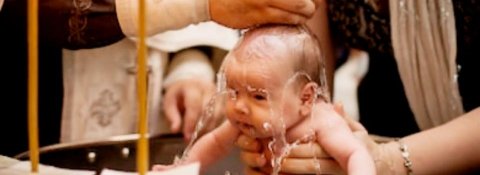 Infant baptism is unbiblical and nullifies the doctrine of repentance
Infant baptism is unbiblical and nullifies the doctrine of repentance
The Correct Pattern is Important
If we don't get the divine tavnith or pattern of water baptism right then we aren't going to get spirit baptism right either - obviously - because spiritual baptism must be an exact mirror of the water one - there must be a full or complete immersion in the Ruach (Spirit), not a partial one. Now a water-baptised believer doesn't have to be perfect but he or she does have to know what he's or she's doing. It's a covenant, like marriage, only it's to Messiah. Mistakes will be made, but repentance is available daily, just don't fall for the 'Once saved, Always Saved' lie and related Calvinistic errors.
Summing Up
Let's now start summing up the main points and ask some serious questions about our main theme. In the light of the way John the Baptist uses the symbolism of a road, water, fire and axe, what does he plainly mean when he says that Christ "will baptise you with the Ruach haQodesh (Holy Spirit or Blast of Wind) and fire...[and]...winnow the chaff from the corn, and...clear every speck of rubbish from His threshing floor. His corn He will gather into the storehouse; the chaff He will burn with fire that nothing can put out" (Mt.3:11b-12, Barclay). What is the "fire" actually doing?
Fire is for Judgment, for Destruction or Purification
Well, what does fire signify in Scripture in the context of the verses before when the religious leaders are rebuked? This kind of fire represents the anger and judgment of the wicked by the Creator. But what of the penitent righteous? What is the fire for them? Cleansing, purification and testing as we talked about in Part 1 when we identified the power of Ruach (Spirit) Baptism as gevurat or the power of divine judgment.
The Fire Identified
We have therefore clearly and unambiguously identified what the fire component is in this 'Baptism of Fire' spoken of by John. Everyone gets immersed in it, including the wicked, but the results are different depending on the faith and works of each individual. It's sorting out time for the 'baptised'. Let's dig a little deeper into Scriptural 'fire' as experienced by the qodeshim (saints, set-apart ones) in particular.
Fire in the Prophets' Bones
When Jeremiah wanted to refrain from speaking Yahweh's Davar (Word), he found it impossible. Why? Because it proved to be like a burning fire shut up in his bones (Jer.20:9). I know the feeling because it has been the same for me delivering prophetic messages in the years leading up to this particular time. When John the Immerser rebuked the Pharisees and Sadducees, it was the same experience for him. The "messenger of the covenant" (Yah'shua/Jesus) is likewise compared to a refiner's fire, a fire used in purifying gold and silver (Mal.3:1-3, NKJV).
Twin Silver Trumpets
Every Rosh Chodesh, when a new monthly cycle begins, and at Yom Teruah (Feast of Trumpets/Shouting) when the return of the Messiah is blasted out through twin silver trumpets, pure, unadulterated emet or truth is being blasted with ruach, spirit of breath, because silver is the symbol of truth. The fire burns away lies leaving only emet (truth) for it is written:
"The devarim (words) of Yahweh are pure words, like silver tried in a furnace of earth, purified seven times" (Ps.12:6, NKJV)
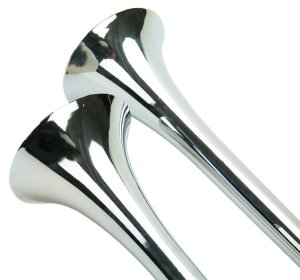
Seven Purgings by Fire
I repeat, the immersion or baptism in fire is for the purpose of PURIFICATION and JUDGMENT. The Ruach haQodesh (Holy Spirit) cannot reside in the fullness in humans - in other words, one cannot be FILLED with this - UNTIL the fiery truth has done its purging work on the soul. And one purging is not enough - there must be seven (the number representing completion), as the Psalmist declares, and those seven purgings correspond to what each of the seven annual festivals teach us about an authentic life in Christ. The one who is thus purged is an overcomer - and guess how many 'overcomings' Scripture speaks of? Yes, seven (Rev.2:7,11,17,26; 3:5,12,21):
"He who overcomes (= the 7 overcomings) shall inherit all things, and I will be his Elohim (God) and he shall be My son" (Rev.21:7, NKJV).
Clean, Divine Ruach-Power
So what is the Baptism of the Ruach (Spirit)? Is it the same as the Fire Baptism? No, as I shall aim to show in the days ahead, even though the two are related. The Ruach (Spirit) Baptism is, as one minister puts it, clean divine power, with the emphasis on 'clean'. It's the 'whole works', a full 'baptism', not just a portion, sample, sprinkling, or a carefully measured part in proportion to the degree of our repentance. No, its the full blast, an explosion of pure Divine Power, that fills the prepared vessel. It is the prerequisite to any authentic spiritual or supernatural giftings or resources that we aren't simply just born with. (Both need cultivating but some are 'birth gifts' and others 'New Birth gifts'). It comes together with, and is inseparably connected to, purification and judgment by fire, by cleansing, and that, my friends, can be, and usually is, painful.
Unseating of the Pretenders
And it's abolutely destructive to the wicked and insincere making a pretense of their religion so woe unto the fakes when days of judgment arrive! That's when the axe gets to work and chops the tree - the person - right down next to the root, ending their ministry and snuffing out their false cover as believers. The sheep-fleeces are ripped off the wolves for all to see what's underneath. The Aaronic, Levitical or Mosaic Priesthood was abolished forever at the cross and those who have continued trying to exercise it before tthe Roman expulsion were at length utterly cut down and expelled from the land when Messiah passed judgment on them at the resurrection and His new ministers took over as representatives of His Kingdom in the Order of Melchizedek at the First Messianic Shavu'ot (Weeks, 'Pentecost').
Flushing Out the Snakes With Fire
The Messianic Shavu'ot ('Pentecost') anointing also took care of the religious hypocrites whom both John the Baptist and Yah'shua (Jesus) had earlier rebuked in their ministries. Like snakes slithering away from a bonfire where they'd been hiding when it began to burn them, those religious hypocrites soon fled.
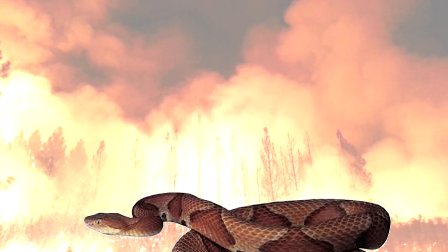 When the fire comes, the snakes scurry into the open in panic
When the fire comes, the snakes scurry into the open in panic
The Three Anointings
It doesn't matter what kind of anointing Yahweh sends to His faithful talmidim (disciples), whether it be the Neshamah-type Sukkot (Tabernacles) anointing to come, or the Ruach-type Shavu'ot ('Pentecost') anointing that took place in Jerusalem 2,000 years ago, or the even earlier anointing that burst upon Israel at Mount Sinai in the days of Moses, the snakes will run because imposters cannot abide the purging Fire, the pure Light of Truth, the true Almighty Wind of Yahweh that blows down all but the authentic 'trees' (believers) whom it fills.
The Sin of the Pharisees
The irony is that the Pharisees prided themselves on their purity and yet they were anything but pure, the chief of their sins being pride and arrogance, both defining features of Satan, as well as having an inflated sense of their own self-importance, of being 'holier' than those around them: "I thank You that I am not like other men" (Luke 18:11, NKJV) they smugly prayed. Their whole demeanour was quite out of keeping with the humility needed of the people before the coming of the true King of Israel, for they lacked what the penitent tax-collector possessed, who had who prayed: "Elohim (God), be merciful to me a sinner!" (Luke 18:13, NKJV).
The leaders were, in any case, not looking for a Suffering Servant (Is.53), but were expecting another Judah Maccabbee, someone like Barabbas (Mt.27:16-36), a man at the opposite end of the spiritual spectrum and not remotely like Yah'shua the Messiah (Jesus Christ) - see The Two Yah'shua's (Jesus').
Equipping and Purification
Whether or not you understand all the multi-layered theological points that I have been making today is not as important as the necessity of understanding that Spirit and Fire Baptism equip and purify the humble soul by getting rid of all the garbage and excess baggage of sin we needlessly carry around, and when that baptism happens you know it and you know Elohim (God) in a way you never knew Him before.
Origins of Modern Pentecostalism
Remember also that those talmidim (disciples) at the First Messianic Shavu'ot (Weeks, 'Pentecost') were all Torah-obedient - they were not modern lawless 'Pentecostals' or 'Charismatics', so there was a world of difference between them. The true Fire Baptism burns out the disposition to any, and all, lawlessness just as the Ruach (Spirit) brings forgiveness to the penitent for their lawless deeds (Rom.4:7; 2 Thes.2:8-9; Heb.10:17; Tit.2:4; 1 Tim.1:9)! The true fire doesn't entrench lawlessness and the true Ruach (Spirit) doesn't proclaim the imaginary 'freedom' or 'liberty' to act solely on the basis of ones feelings! That is why the Spirit and Fire Baptism, so-called, of the Pentecostals and Charismatics, so-called, is counterfeit, conceived and birthed in 20th century California (Azuza Street), the state of Kali (Hindu goddess of destruction) and Forneus (demon of fornication). Don't wonder that the American state of Kaliforneus has been at the forefront of leading the USA to destruction and why it has to be purged if America is to survive.
Impatience Birthed the Wild Psychic Movements of Today
They were impatient for the original gifts to return but were not willing to do the Torah work to establish the correct spiritual foundation. They wanted to remedy the deadness of the churches but not to be burned clean with the real spiritual fire, at least not on Yahweh's terms. They wanted to retain their Protestant 'freedom' to follow their feelings. So what they got was the impure, fleshy version of the Nefesh haQodesh, with outbursts of psychic energy that superficially look like the authentic Ruach (Spirit) for those who have never actually experienced it, and those Protestants never had or they would have discerned the difference! This psychic energy they released into the world waxes and wanes, and ebbs and flows, like all earth-bound phenomena, the same fleshiness that birthed the next level of lawlessness in the Charismatic Movement. That's why they need to work themselves up to a feverish pitch in order to supposedly get it to 'work' for 'miracles' to happen.
There's Emunah-Faith and 'Faith'
They had faith to be sure, and faith is always rewarded in some fashion, but they did not have the biblical emunah-faith that always leads to Torah-obedience. Today, as then, they babble like the original conspirators at Babel after they were confounded and scattered, who sought to storm Heaven with a man-made tower of self-importance, a giant ziggurat charged with the occult power of their incantations and satanic blood-letting. A century of babbling, followed by howling, being 'slain', wildly contorting, passing out, hissing, and so forth, has simply multiplied the confusion. And that is why their self-styled and self-acclaimed 'prophets' are getting false predictions right now as I speak, bringing more shame on, and disgrace to, the Name of Christ.
True Freedom Includes Torah Responsibility
It's not because there aren't genuine charismata, it isn't because Yahweh has brought them to an end as the Cessationists teach, it's because they are lawless in their hearts (like the Cessationist Protestants themselves, for the most part, actually). They want, as every child does, to stubbornly have their foot-stomping own way, to have freedom without responsibility, and lots of 'free stuff' from the heavenly dispensing machine, which is why they are lured to all the Benny Hinns, Joel Olsteens and Kenneth Copelands of this world making wild and fantastic (yet unbiblical) promises to them. They want, in short, a heavenly 'Sugar-Daddy' to give them material paradise on earth. The Body of Messiah is supposed to be a Covenant Bride living by the Ketubah contract given at the original Shavu'ot (Weeks, 'Pentecost') to obey the mitzvot (commandments) - she can't pick-and-choose willy-nilly according to what her heart fancies at any one moment, or era, of time.
Of Wealth and Poverty
The Body of Messiah is made up of avadim - servants - of the Most High. Elohim (God) does not run a payment-free heavenly Wallmart for us. We can't just 'name and claim' whatever we want. It's His will, not ours, that's the 'name of the game', and the investment is in heavenly rewards, not earthly. Indeed, as the Saviour said, "he who lays up treasure for himself...is not rich toward Elohim (God)" (Luke 12:21, NKJV). Yet see what the Master says of such:
"Because you say, 'I am rich, have become wealthy, and have need of nothing' -- and do not know that you are wretched, miserable, poor, blind, and naked -- I counsel you to buy from Me gold refined in the fire, that you may be rich; and white garments, that you may be clothed, that the shame of your nakedness may not be revealed; and anoint your eyes with eye salve, that you may see. As many as I love, I rebuke and chasten. Therefore be zealous and repent. Behold, I stand at the door and knock" (Rev.3:17-20, NKJV).
Yes, it's on deceived believers' doors He knocks even though this passage is commonly used for evangelism of unbelievers!
Pentecostals Called to the Bride
Having said all of that I have to state categorically that I have met, and know of, many wonderful, inspirational Pentecostal Christians who have a passionate love for Christ, who are authentically born-again, who have tremendous faith, who experience real miracles in their lives and who have produced some wonderful worship music (before it went wild). Yahweh takes us where we are in our spiritual journey and uses whomsoever He will in the days of our ignorance. But if Pentecostals and Charismatics want to come up to the end-time Remnant Bride they have to shed all the lawlessness and false charismata they cling to so dearly, from which they seek spiritual validation. There are just no two ways about it. And as I have said before, the vast majority of them claiming to be 'prophets' are operating out of a false spirit.
Pentecostals Have Blessed Me Along the Way
I have learned a lot from Pentecostals, as I have from believers from most denominations, whom Yahweh has clearly used in their day, and I have absolutely no problem being tutored by them. Merlin Carothers springs to mind, author of Power in Praise and Prison to Praise which I have read several times. I have huge respect for holiness Pentecostals who, in some respects, are even more Torah-obedient than some Messianics in key discipleship areas! My sole message is that we have all of us got to clean up our discipleship acts! Yah'shua (Jesus) insists on one Messianic Community, one Church that is echad (one) with Him and with each other (Jn.17). Sectarianism and denominationalism have to end, but so do all the false doctrinal walls separating us - they have to be torn down, and that's why Yahweh send trial and tribulation so that we can see what endures and what does not!
The Need to be Careful and Thorough
Well, we have much to talk about next week, this sermon has once again gone over time and I have still only scratched the surface! But we have to get the basics right and it behooves us to tread carefully and be thorough. We haven't even yet looked at what Paul said about Spirit and Fire Baptism which is where most start without the proper background we have discovered in John the Baptist's sayings. We also need to remember that Yah'shua's (Jesus') Kingdom Message wasn't just about healing and comforting people but it was was also the stern and solemn warning that when Elohim (God) comes back to reclaim His world - this world - that He demands absolute allegiance and total obedience. If Elohim (God) is ahavah (love) and chesed (mercy, grace), as the apostle John teaches (1 Jn.4:8,16), then He isn't simply the kindly, indulgent, easy-going Parent that most 21st century Christians now imagine Him to be because that's what they want. He is no sugar-daddy dispensing blessing at our every whim, and we certainly can never command Him to do things for us as Charismatics do. That's the Gospel reshaped and distorted in the image of the worldly philosophies of modernism and postmodernism, and we're not supposed to be of this world. Yet the world likes them, a fatal commendation indeed! John said:
"They are of the world [system]. Therefore they speak as of the world, and the world hears them" (1 John 4:5, NKJV).
Questions to Ask Ourselves
In the meantime I would like to invite everyone to consider how you can get ready for Yah'shua's (Jesus') return, which is pretty close, well within an average lifespan. Where do the roads need straightening out? What fires need to be lit, to burn away the rubbish of sin on His path - our sin? Which dead trees will need to be cut down? And, vitally, who should be sumnmoned right now to repent? These are questions we need to be asking ourselves. We start, of course, with ourselves and then we move out into the Messianic Community (Church) itself and finally into the world.
Conclusion
Yahweh bless you and keep you until we meet again, in Yah'shua's (Jesus') Name. Amen.
Continued in Part 5
Endnotes
[1] See, in particular, the four key Olive Branch revelations on the Temple (OB 312; 316; 317; 318).
Acknowledgements
[1] Jackson H. Snyder II, Spiritual Gifts Revelation 2: Miracles by the Book, 7.0 (Lulu, 2004)
[2] Gabriel Roth, 5th edition, Aramaic English New Testament (Netsari Press, 2012)
[3] Tom Wright, Matthew for Everyone (SPCK, London: 2002)


V233
|


